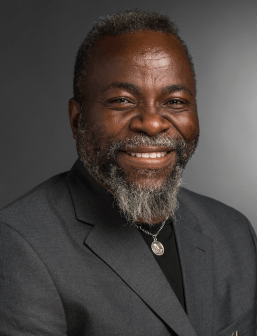Ernest Fokoue is working with the Rochester Police Department to enhance police training. A professor at Rochester Institute of Technology, Fokoue has received a $1 million grant to use statistical machine learning to analyze body-worn camera footage.
The grant, which comes from the U.S. Department of Justice and RPD, will support the study over three years. Professor John McCluskey from RIT’s Department of Criminal Justice will serve as a key contributor to the project.

In 2016, RPD began its body-worn camera initiative, which aimed to improve police-community relations. Some 500 body-worn cameras are now assigned to patrol personnel, officials say.
According to Fokoue, a professor in RIT’s School of Mathematical Sciences, the program has access to large amounts of data, making it challenging for a human to analyze for trends. By using artificial intelligence, he believes the data can be mined for model behavior, helping the RPD build trust in the community.
“The hope is that this is as objective as it gets,” Fokoue says. “The camera doesn’t decide what was happening at the scene, so the idea is to analyze what it picks up in an objective way. We hope to see patterns emerging through natural-language processing and to share the findings with other police departments around the country.”
The project aims to:
■ Produce publishable datasets built from a model scanning RPD body-worn camera footage;
■ Use video examples for the RPD to analyze for defensive and de-escalation tactics;
■ Develop algorithms to transcribe body-worn camera audio and flag specific words, help compare written reports with facts observed by body-worn cameras; and detect biased behavior by RPD officers; and
■ Identify effective de-escalation tactics used by RPD officers.
“The Rochester Police Department is lucky that its location gives it easy access to world-class research universities,” says Adrian Martin, a data analyst for RPD. “Professor Fokoue is recognized internationally as a leader in the field of statistical machine learning, and we have enjoyed working with him for the past several years on other projects.
“The current grant-funded project will help RPD improve upon our already successful body-worn camera program by using our vast amount of footage for training, compliance, and increasing our transparency to the public.”
On average, the RPD creates 70 hours of footage every day—a challenge for officers or supervisors to review, Martin says.
“With the assistance of Dr. Fokoue and others at RIT, we will be able to build tools to help us flag specific videos for supervisor review; tools to monitor the entirety of our video footage for new training needs and opportunities; and we’ll be able to help the public better understand what our officers encounter on a daily basis without compromising the privacy of officers or members of the public seen on video,” he says.
RPD expects to hire an analyst for the duration of the grant. Fokoue is on the lookout for a doctoral student to help with the study.
Smriti Jacob is Rochester Beacon managing editor. The Beacon welcomes comments and letters from readers who adhere to our comment policy including use of their full, real name. Submissions to the Letters page should be sent to [email protected].